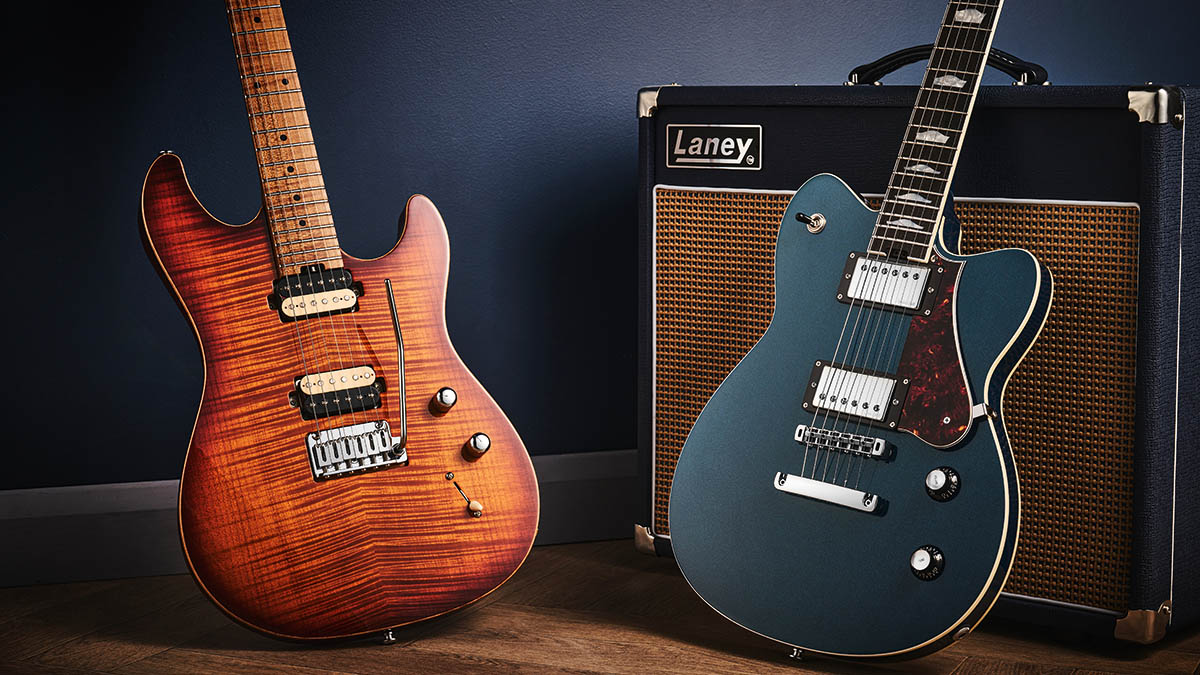
For many years, Gordon-Smith (the original company used a hyphen) was almost the UK’s best-kept guitar-making secret. The brand never advertised its wares or drove around in posh cars, preferring a small (very dusty!) workshop a couple of doors down from a laundrette in Partington, just outside Manchester.
It might not sound very rock ’n’ roll, but the almost-punk DIY ethos informed the guitars and many players picked up a GS-1 or Graduate because they couldn’t get – or afford – a Gibson. And spending time with John, Linda and Chris was always a hugely enjoyable experience.
Today’s hyphen-free company has, over the past nine years, brought Gordon Smith into the modern age, with the electric guitars now made in Higham Ferrers. As we discuss with owner and MD Doug Sparkes in the interview that follows this review, the brand is also just about to move into a new workshop down the road.
You could argue that a new chapter of Gordon Smith began with the Gatsby, a very stylish offset guitar that was launched in 2021. The next new model (or rather models) came with the Gibson Firebird-inspired Griffin and the reverse-style Griffin Flip.
Our new, original-shaped Grande model seems to take some design cues from that Gatsby. It’s as if the more accented offset outline has been squashed a little. For instance, its waist and base are still offset but only lightly, and the bass-side horn is pulled in a little, though both horns are similar in style to the Gatsby.
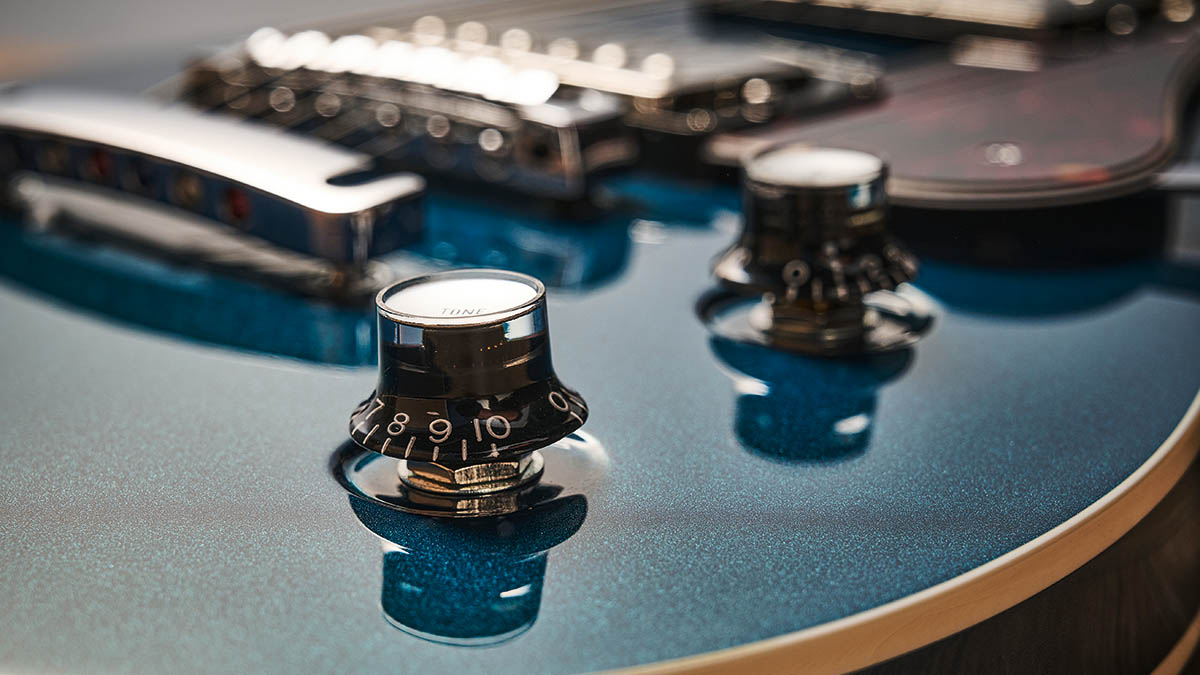
You get a whiff of Gretsch’s downsized double-cut outline, and perhaps a nod to Reverend, but overall the Grande comes out very much as its own thing.
Unlike the Gatsby’s Fender scale, the Grande is based around GS’s version of the old Gibson scale length – measured by John Smith back in the day. But the first thing you notice is the light weight of 3.02kg (6.64lb) thanks to the obeche body: solid, not chambered. What is less obvious from a face-on view is the body shaping.
Longitudinally, it has a flat top and back, but both are lightly curved across the body. It’s not a new concept, but with the clean white binding around both top and back edges it creates a rather unique and really very graceful shape that’s about 45mm thick in the body centre, slimming down to 32mm on the edge of that lower bout, while the small tortoiseshell pickguard is another more-classic reference.

This classic/modern theme continues to the glued-in mahogany neck with a very traditional plastic-capped heel where the top strap-button sits. The crown-shaped inlays look like they’ve come from an old archtop or the like, and the ebony ’board is fully bound like the headstock.
This traditional craft, however, is peppered with modern style such as the spoke-wheel truss rod adjuster, not to mention the stainless-steel frets, the lozenge-like Gotoh 510 tuners and the rather neat, modern‑looking bridge and tailpiece.
Grande Designs
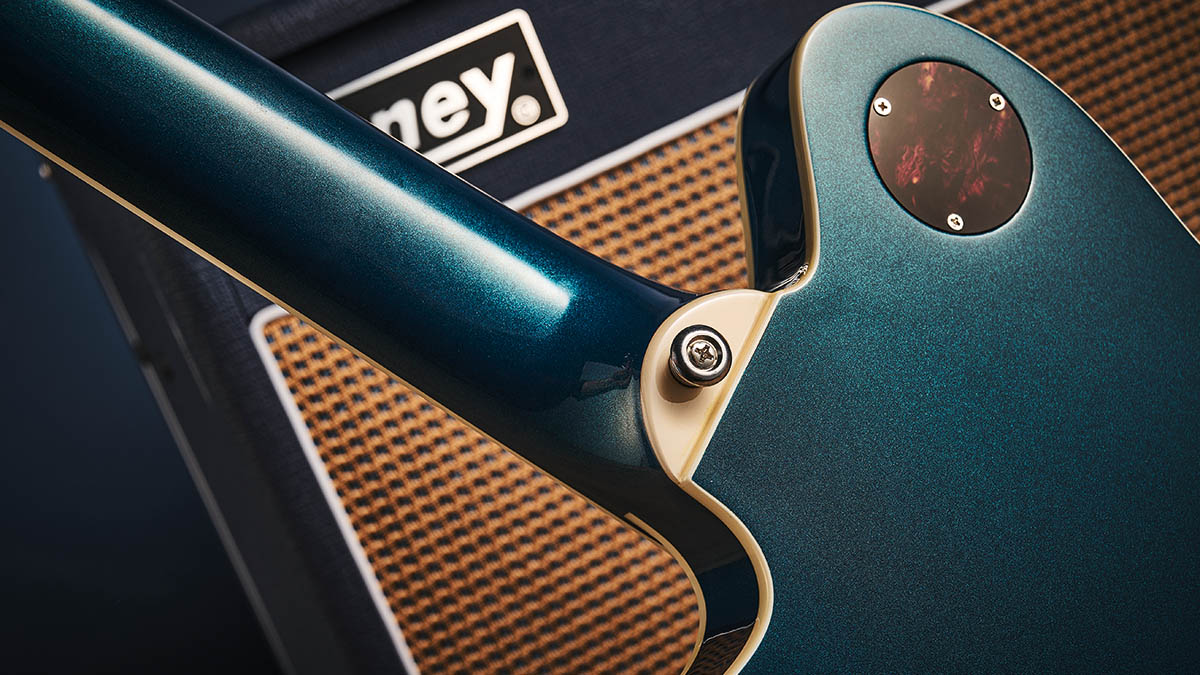
Gordon Smith has long offered its Classic S and T versions of Fender’s finest. The Geist takes the Classic S and gives it a posher super-S-style makeover: a pretty timeless design that’s enjoying a healthy renaissance, not least among our Brit builders.
Does the Geist bring anything new to the genre? Not really, but it is very well executed, has a good weight of 3.17kg (6.97lb) and, as you can see, it’s not in the loftier price range of many USA builders making a similar style.
We have a mainly obeche solid body (two piece, centre-joined) capped with a finely striped thin flame maple top that’s dropped over the forearm contour, squashing a thin black poplar veneer between the two. The deep amber sunburst top is rather beautiful, too, the edge scraped cleanly to create the PRS-style faux binding.

That colour is perfectly matched by the quarter-sawn roasted maple neck and fingerboard, which uses a longer Fender-like scale length. The neck screws to the body on a nicely shaped, rounded nose heel and is peppered with simple black dots and stainless-steel frets, with that spoke-wheel truss rod adjuster located at the body end.
There’s some pretty deep flaming on its satin-smooth back, too. Like we said, a posher makeover – and with the headstock’s dual tone relief, it’s a class act.
There’s Gotoh hardware here, too: the rear-locking tuners and the industry standard two-post 510 vibrato that’s lightly recessed into the top, giving it a low-profile feel and providing some up-bend.
Like the Grande, the dual humbuckers – which are uncovered here and direct-mounted to the body – have simple switching and control, both with pull-switches to independently voice the single coil-splits.
Feel & Sounds
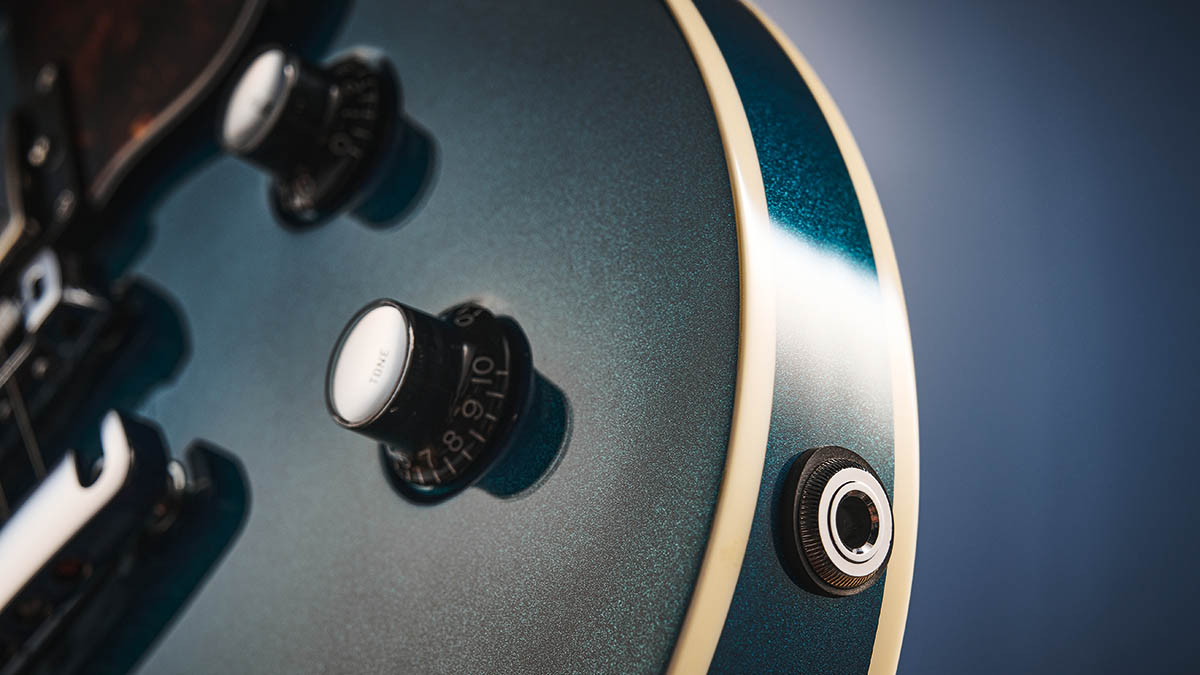
When played seated, the Grande is extremely comfortable and balances well on a strap. And even though the rear strap button means the fingerboard leans a little away from you in playing position (as usual), it feels really good. There’s nothing to adjust to with the Geist, of course, so Strat players will obviously feel very comfortable, especially with the good weight.
While we have different scale lengths, which certainly add their own feel, the actual necks are perhaps more similar than they feel. The Grande has a 20.9mm depth at the 1st fret, 23mm by the 12th, with a 43.4mm nut width and 36mm string spacing, growing to 52.5mm at the bridge. The profile feels like a pretty classic C that some makers might refer to as a ‘60s’ style.
The Geist’s satin-backed finish immediately gives a different feel and suggests a bigger neck somehow. It’s actually very similar, slightly thinner in depth in the higher positions
The Geist’s satin-backed finish immediately gives a different feel and suggests a bigger neck somehow. It’s actually very similar, slightly thinner in depth in the higher positions (22.3mm), and we have a compound radius to add to the subtle difference. For the record, while the nut widths are pretty close we get a slightly narrower string spacing of 35.5mm but wider at the bridge at 54mm.
These seemingly microscopic details all add up, particularly when you throw in the overall setup: the Grande is a very mainstream 1.52mm on both treble and bass sides; the Geist is fractionally lower, which might be too low for anyone without the lightest of touch. The fretwork on both is superb, the same medium jumbo stainless-steel stock with mirror-smooth finishing.
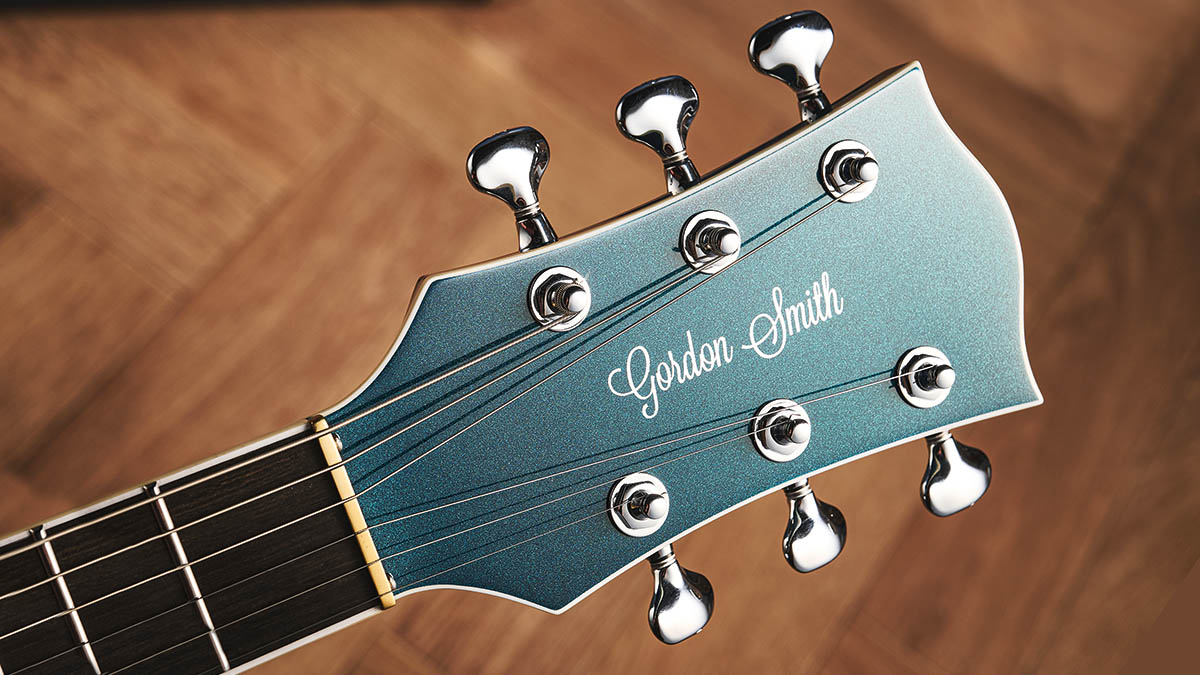
Rather like its appealing feel, the Grande’s sounds match its comfort. There are no surprises, even though it does feel and, to a certain extent, sound like a semi-solid guitar – probably because of its light weight.
The plummy neck voice balances clarity and depth with a full but not over-thick midrange, and on cleaner sounds it easily sits with jazzier and earthy blues styles. This is contrasted by the clean but well-balanced bridge voice that sounds slightly under-powered – but in a good way, producing a timeless jangly 60s-style voice that’s clear but not over-sharp.
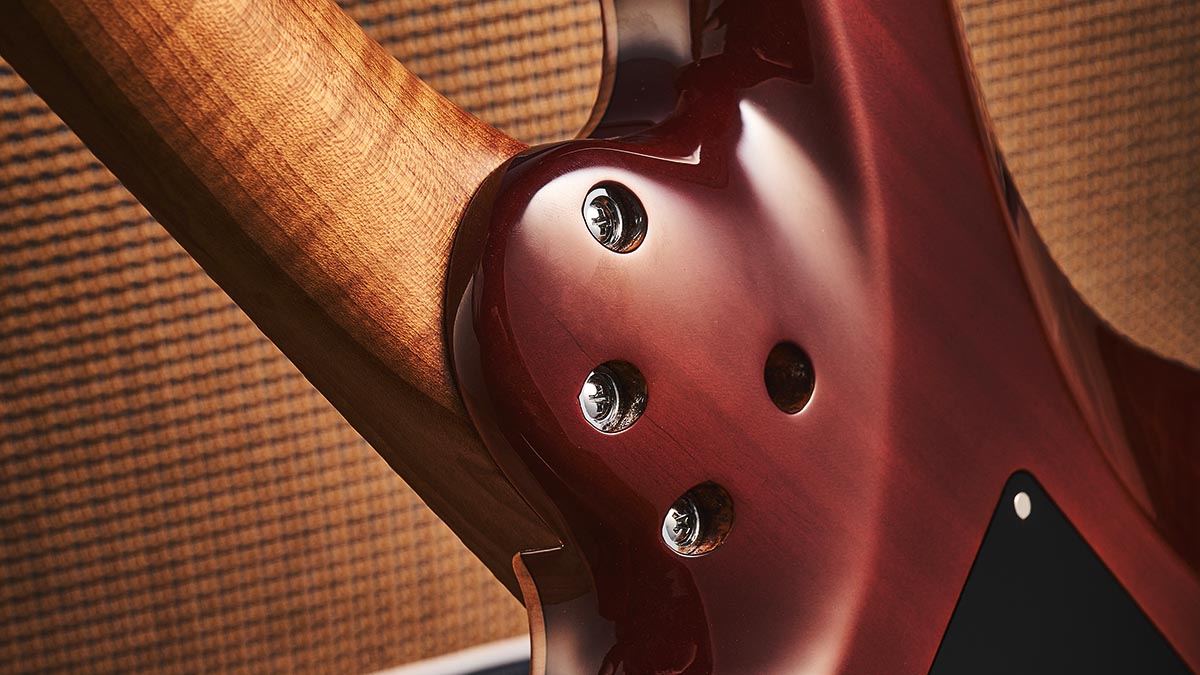
As you’d expect, the coil-splits drop the output, but they’re valid here if only for the mixes – as the pickups independently split, you can mix neck humbucker with bridge single coil, or vice versa, or have both split. And if you use the middle position a lot you’ll appreciate the bounce and subtle tonal shifts.
Listening to a Cream T Aurora with Whiskerbuckers, the Grande doesn’t quite capture that vintage voicing, but the hint of semi character produces an equally valid sound. An engaging, very classic-sounding guitar that works for so many styles.
Not surprisingly, the Geist has a very different voicing with a strong undercurrent of Fender-like snap and percussion that makes the neck humbucker sound almost single-coil like.

There’s no lack of clarity and the bridge pickup brings more heat and nose to the sound, more Duncan JB, and it splits rather well compared with the more thin-voiced neck split.
The mixes obviously don’t match a Strat, but they do give a strong third voice, which hints at an electro-acoustic with some volume reduction and loves some chorus and delay. It’s like we’ve jumped back a few decades into the 80s, not least when you kick in the bridge with some gain for your scene-stealing whammy-bar solo.
Speaking of which, when it’s paired with the locking tuners this well-proven vibrato is pretty stable, and the brass nut is nicely fettled on both guitars. That said, there’s easy down-bend almost to slack here and the low E string falls out of its nut groove – which would probably be cured with a couple of extra winds around the string post.
Verdict
There’s very little to fault or criticise in the Grande and Geist here, and these two diverse instruments illustrate the breadth of models available from the modern Gordon Smith company.
As we discover in our chat with Doug Sparkes over the page, after pulling back its output during the Covid years, the company is back with a new workshop and all guns blazing – and, on paper at least, looks set to become the largest producer of electric instruments in the UK. While our review models are the ‘launch edition’ specifications, like all the other models they will become available to custom order.
The Grande's got a lovely old-world charm about it. Its nicely rootsy jazz/blues voice works effortlessly for classic rock and beyond
Now, while the Geist can hardly be called a new design, it’s well done and with that custom-order facility in mind you’d have a good choice, especially in the area of pickup configurations. It’s also worth mentioning that Gordon Smith’s in-house pickups have improved from the old days.
As for the Grande, not only is this a smartly made model, it’s got a lovely old-world charm about it. Its nicely rootsy jazz/blues voice works effortlessly for classic rock and beyond, although you could just as easily imagine it ordered with a vibrato and janglier pickups to drop it into the Gretsch‑like world.
Overall, then, these guitars represent nice work, are well priced and fly the flag for the UK’s world-class craft. Bring ’em on!
Specs
Gordon Smith Grande

- PRICE: £1,999 (approx $2,499 inc case)
- ORIGIN: UK
- TYPE: Double-cutaway solidbody electric
- BODY: Obeche
- NECK: Mahogany, GS Slim profile, glued-in
- SCALE LENGTH: 625.5mm (24.625”)
- NUT/WIDTH: Brass/43.4mm
- FINGERBOARD: Ebony, Grande Custom inlays, 305mm (12”) radius
- FRETS: 22, medium jumbo stainless steel
- HARDWARE: Gotoh 510 modern tune-o-matic-style bridge and tailpiece, Gotoh SGL510Z-L5 tuners – chrome-plated
- STRING SPACING, BRIDGE: 52.5mm
- ELECTRICS: 2x GS Partingtone humbuckers in chromed covers, 3-way toggle switch pickup selector, master volume and tone controls (both with pull switches for independent coil-split)
- WEIGHT (kg/lb): 3.02/6.64
- OPTIONS: Only colour on this ‘launch edition’
- RANGE OPTIONS: The classic GS starts at £999; the more LP-style Graduate starts at £1,499 but with a large number of options
- LEFT-HANDERS: Yes, same price
- FINISHES: Twilight (as reviewed), Merlot, Sovereign, Juniper – all gloss polyurethane
Gordon Smith Geist
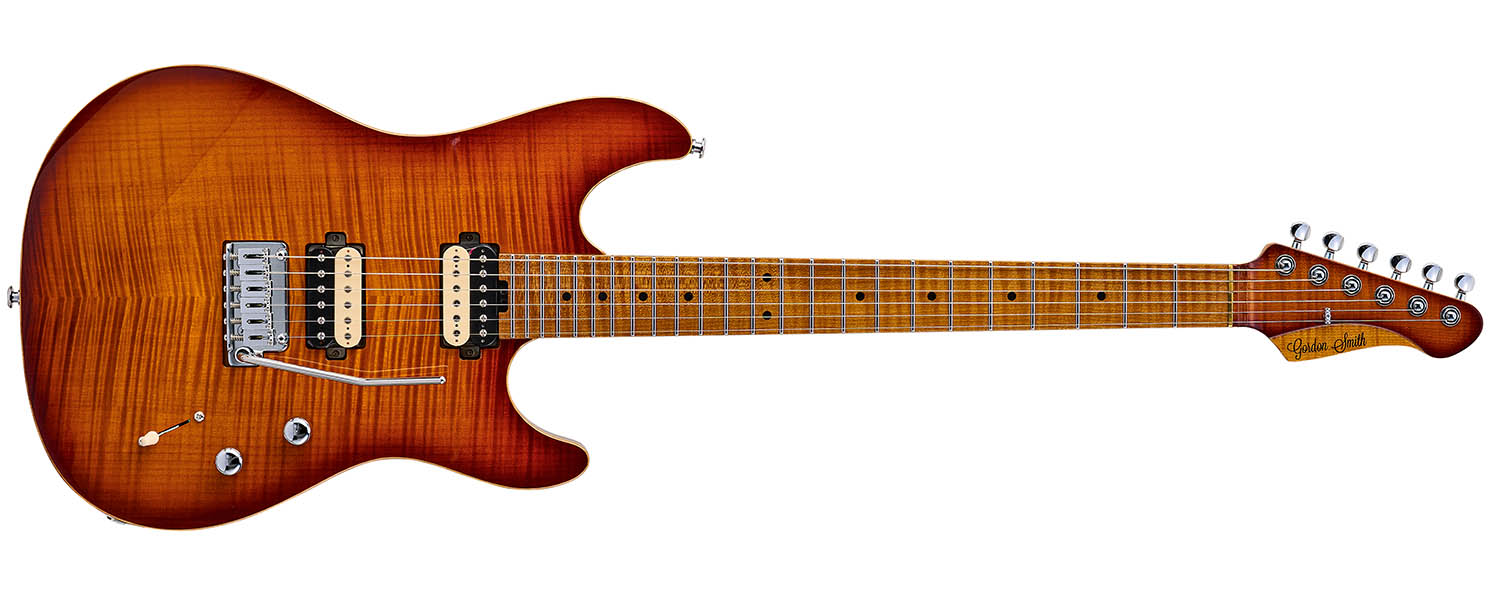
- PRICE: £1,999 (approx $2,499 inc case)
- ORIGIN: UK
- TYPE: Double-cutaway solidbody electric
- BODY: Obeche with flame maple top and black poplar accent pinstripe
- NECK: 4A roasted flame maple, Modern GS Slim profile, bolt-on
- SCALE LENGTH: 25.5mm (25.5”)
- NUT/WIDTH: Brass/43.24mm
- FINGERBOARD: 4A roasted flame maple, black dot inlays, 305-406mm (12-16”) compound radius
- FRETS: 22, medium jumbo stainless steel
- HARDWARE: Gotoh 510T-FE1 vibrato, Gotoh SG301-MGT tuners – chrome-plated
- STRING SPACING, BRIDGE: 54mm
- ELECTRICS: 2x GS Geist humbuckers, 3-way lever pickup selector switch, master volume and tone controls (both with pull switches for independent coil-split)
- WEIGHT (kg/lb): 3.17/6.97
- OPTIONS: Also available with shorter 610mm (24”) scale length and 22 frets
- RANGE OPTIONS: The Classic S starts at £1,099 but has a large list of options. Another bolt-on is the offset Gatsby from £1,299, now in Version II spec, also available to custom order
- LEFT-HANDERS: Yes, same price
- FINISHES: Flare (as reviewed), Lava, Cobalt, Carbon – gloss polyurethane (body and headstock face), acrylic satin neck back
- CONTACT: Gordon Smith Guitars






